The Absence of Ministers at COP16 CBD
Indonesia’s delegation at COP16 CBD in Cali, Colombia, is not led by a minister. Biodiversity funding is at risk of not being agreed upon.
maaf email atau password anda salah
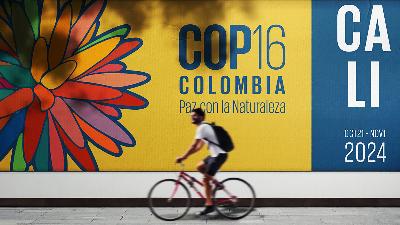
Indonesia’s delegation at COP16 CBD in Cali, Colombia, is not led by a minister. Biodiversity funding is at risk of not being agreed upon.
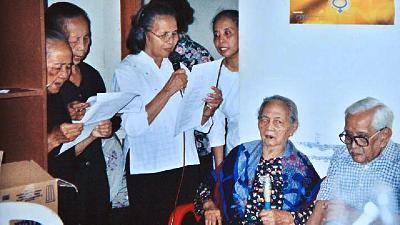
Former chairperson of the Indonesian Women’s Movement left the history of 1965 behind upon her release from prison. Umi Sardjono did not say much about the bloody event of September 30, 1965.
AUGUST 6, 1945.
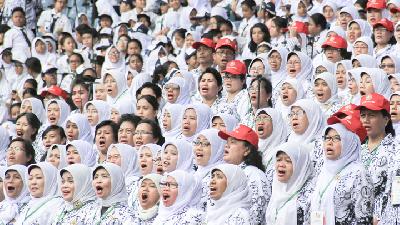
A research conducted by the Center for Islamic and Social Studies (PPIM) of Syarif Hidayatullah State Islamic University has indicated that the majority of Muslim teachers in Indonesia are intolerant of other religious adherents. Based on a PPIM survey of 2,237 teachers, those maintaining the intolerant view constituted 63.07 percent of respondents. “The research aims at examining the pluralist view and attitude of school and madrasah (Islamic school) teachers in Indonesia,” said PPIM Executive Director Saiful Usman last Tuesday.
Detainees and convicts from terrorism cases jailed in the Salemba Detention Facility of the National Police's Mobile Brigade Command Headquarters in Kelapa Dua, Depok, West Java, rioted and attacked police guards and members of the Special Counter-Terrorism Unit on Tuesday last week. After taking possession of firearms, rifles, and explosives which they took from officers and the evidence room, they held six members of the Special Counter-Terrorism Unit hostage and took over the facility for 36 hours. The rioting inmates, numbering over a hundred, surrendered after being surrounded by thousands of police. Six people died during the tension-filled incident: five police officers who had been taken hostage, and one inmate.

The two-day 'National Symposium on Dissecting the 1965 Tragedy: A Historical Approach' last week got nationwide and international attention.
It was, after all, the first time that the government hosted a forum to openly discuss and debate the mysterious and dark events of 1965.

Malaysian Attorney-General Tan Sri Mohamed Apandi Ali has declared there was no sufficient evidence to indict Prime Minister Najib Razak over allegations of receiving illicit money worth US$681 million. He said the funds in Najib's personal account were donations from the Saudi royal family and that some of them had already been paid back.
Last Tuesday, as a result, Malaysia's Kedah State Chief Minister Mukhriz Mahathir tendered his resignation. The son of former Premier Mahathir Mohamad said he was aware of waning public support after falling out with the United Malays National Organization (UMNO) leader.

The International People's Tribunal 1965 a hearing last week on crimes against humanity in Indonesia following the 1965 political upheaval held in the Dutch capital of The Hague, impacted three distinct groups. The first are the condemned and the vilified, senior military officers and government officials, and even a few historians clinging to tired old slogans about 'latent dangers of communism'.
The second group are those who regard the tribunal as little more than a game, not worth their time. The third group are people who believe that the tribunal is an effort to record the facts, which in turn would lead to pressure aimed at a United Nations resolution.

It is only a month before the closing of company books for 2015. In retrospect, it has been quite a dismal year. In January, there were high expectations, being the start of President Jokowi's first year in office. But by the year-end, the results were disappointingly far below expectations. This year's economic growth is expected to reach only 4.8-5.0 percent, in contrast to the 6.0 percent target set by the new administration. The Rupiah and the Jakarta Composite Index (JCI), which began the year, respectively at Rp12,500 per US$ and 5,200 points, dropped considerably, settling at Rp13,600 per US$ and 4,500 points by year-end. With sluggish economic growth, businesses have been forced to adjust downward this year's revenue targets. Along with the decline in sales, companies have been busy cutting costs, which at times hurt employment. Unfortunately, the cost cuts are rarely able to match the drop in revenue. As a result, profits have narrowed across the board.
The follow-up question is whether our economy has reached its lowest point and that by next year it should start to recover? In various economic seminars towards year-end, numerous experts are facing difficulty in assessing next year's outlook. Even the optimistic scenario predicts this year's sluggishness will extend till the first half of the year and the recovery to take place only after mid-year. The problem, they argue, is that the level of volatility or uncertainty remains high.

A few months ago, cases of Indonesian migrants workers in Hong Kong being abused by their employers came to light, such as the plight of Erwiana Sulistyaningsih and Elis Kurniasih, who died accidentally in an overcrowded shelter. "We need to have a system to deal with those bad cases," said Emily Lau, 63, a member of the Hong Kong Legislative Council and chairperson of the Democratic Party.

QUITE a few critics have expressed their doubts about the capacity of Muhammad Prasetyo as attorney general. Based on his tenure as deputy attorney general for general crimes between 2005 and 2006, he was regarded as an average performer. Add to that, the fact that he later became a full-time politician.

The recent Sixth UN Global Forum on the Alliance of Civilizations, which is aimed at mobilizing action against extremism through the forging of international, intercultural and interreligious dialogue, brought together world leaders and luminaries to Bali, venue of the conference. Among them was 60-year-old John Ashe, an Antiguan national who currently chairs the 68th United Nations General Assembly. Ashe, who holds a doctorate in bioengineering, is no stranger to global affairs, having been involved with the UN since 1989, at first working in his country's permanent representative office and subsequently serving in various UN agencies and as his country's ambassador, before taking up his current posting. He spoke to Tempo English reporter, Yuli Ismartono, on a number of global issues. Excerpts:

The central government and the Tuban administration are in dispute over the laying of a pipeline that will bring oil out from the Cepu Block, Bojonegoro, and the Tuban Block. Targeted oil production of as much as 960,000 barrels per day is threatened. Lobbying by several state institutions was able to crush the Tuban Regent and on Thursday this week the license will be issued.

Attempts to bring to trial cases of human rights violations during the 1965 tragedy still have a long way to go. Suharto somehow managed to remain out of the justice system’s reach.

More than 3.6 million cubic meters of timber are cut down each year in Papua, Indonesia’s last virgin forest redoubt.

ENVIRONMENTAL experts say that Jakarta is committing ecological suicide. The air quality in Indonesia’s capital city has become so bad that in 2006 the World Health Organization (WHO) warned that Jakarta had become the third most-polluted city in the world after Mexico City and Bangkok. In one year of living in Jakarta we only enjoy clean air for 22 days, 223 days of medium-quality air, 95 days breathing unhealthy air and four days of extremely unhealthy air. Around 80 percent of Jakarta’s air pollution is caused by vehicle exhaust emissions and 20 percent from industry.
During the massive floods last February, around 69 percent of the city was inundated. During a similar disaster in 2002, “only” around 25 percent was submerged. And during the dry season Jakarta runs short of water. It turns out that the ground level is sinking by 2-8 centimeters per year. According to the Indonesian Forum for the Environment (Walhi), seawater intrusion has already reached as far as the National Monument in Central Jakarta.
The largest cause for the slump in the quality of Jakarta’s environment is the increasing decline of open green space. As we know, open green space not only functions as the city’s lungs, but also as a buffer against all of the effects of environmental damage. This is truly regrettable because Jakarta once had a city administration plan that was very pro-environment, the 1965-1985 Jakarta Master Plan, which was also the city’s first master plan. Included in the design was the concept of a greenbelt which would be a part of open green space covering 37.2 percent of the city’s land area. Only around 10 percent of this open green space now remains.
In order to add some spice to the start of Jakarta Governor Fauzi Bowo’s term in office, in this issue Tempo is featuring a report on Jakarta’s city administration and green open spaces. We want to illustrate just how much Jakarta’s environment has changed—and for the negative. Some believe it is the time to halt this decline. One example is what is being done by residents such as Chaerudin at the Pesanggrahan River and Abdul Khodir in Condet (see Safeguarding Our Grandchildren’s Future). They are now enjoying a small slice of a greener Jakarta.

After 61 years of independence, the sense of communal harmony appears to be fading. Yet a handful of peacemakers tirelessly work on to sow the seeds of hope.

An entertainment tycoon and a close associate of Prime Minister Thaksin plans to take over Thailand’s two major newspapers, setting off questions over the future of press freedom in that country.

Koizumi’s plan to reform the Japanese Postal Service will be decided by the results of the parliamentary election on September 11. His opponents regard him as more evil than Hitler.

Junior Attorney General Hendarman Supandji has decided to replace the chief investigator of the Bank Mandiri loans scam case. The investigator is accused of taking too long to declare suspects in the case.

FRESH air was blowing in Vietnam, 1986. The country, torn by protracted war, decided to launch doi moi—perestroika Vietnam-style. Various doors, closed since the war, have now been opened with ‘lubricants’ added: deregulation, land reform, and a revived business climate. This step is expected to go a long way in changing the face of Vietnam. Is it true that doi moi has become an effective formula to change Vietnam, which is dubbed Asia’s ‘little dragon’? Here is a travel report from Tempo’s Mardiyah Chamim, who visited Hanoi, the capital of Vietnam, last month.
Intermezzo Tuesday, November 9, 2004 Edition

Controversy over investigations into the July 27, 1996 incident has again surfaced.

After propping up the Sukhoi deal with a US$26-million instant loan, Bukopin is rushing to provide credits to the commodity exporters.

Dangdut singer Inul Daratista is censured for her eroticism, leading to calls for a ban on her performances.

Karen Armstrong wrote The History Of God. She became more famous with the books Battle For God and Muhammad: A Biography Of The Prophet, which sold out all over the world. Today, this former nun has become a leading scholar on religions and God. She is known as a scholar who sympathizes deeply with Islam and is eloquent in her examination of religious fundamentalism. What is the essence of Armstrong’s thoughts? How does she view atheism? Although she’s an expert on Judaism, Islam, Catholicism and Buddhism, she often refers to herself as a ‘freelance monotheist’, meaning that she believes in God but does not practice any religion. Is this true? Read TEMPO’s exclusive interview with Karen Armstrong.

Karen Armstrong wrote The History Of God. She became more famous with the books Battle For God and Muhammad: A Biography Of The Prophet, which sold out all over the world. Today, this former nun has become a leading scholar on religions and God. She is known as a scholar who sympathizes deeply with Islam and is eloquent in her examination of religious fundamentalism. What is the essence of Armstrong’s thoughts? How does she view atheism? Although she’s an expert on Judaism, Islam, Catholicism and Buddhism, she often refers to herself as a ‘freelance monotheist’, meaning that she believes in God but does not practice any religion. Is this true? Read TEMPO’s exclusive interview with Karen Armstrong.

The lack of a citizen army gave birth to a ‘caste of paid military officers.’ Indonesians, however, are more than willing to defend their country.

Two food estate projects are simultaneously being launched, targeting 2.29 million hectares of forest and land in Merauke. There are intrigues involving Prabowo and Jokowi. This report is part of a collaborative coverage and research initiative by Tempo, the Pusaka Bentala Rakyat Foundation, and Trend Asia.

Anindya Bakrie ousted Arsjad Rasjid as the Chair of the Indonesian Chamber of Commerce and Industry (Kadin). The organization is becoming like a political party and enjoys large funds coming in from overseas.

During his two terms in office, Jokowi is suspected of weakening the executive oversight institutions. The parties follow his lead without reservation.

The structure of Indonesian democracy is weakening because its foundations are being undermined. A Javanese word to describe the situation is nglimpe, which is to deceive secretly.

Indonesia is still one of the largest markets for global drugs. There is overlapping law enforcement from the BNN and the National Police.

Prabowo is challenging the markets by showing his intention to increase government debt. Investors must be ready to face volatile markets.
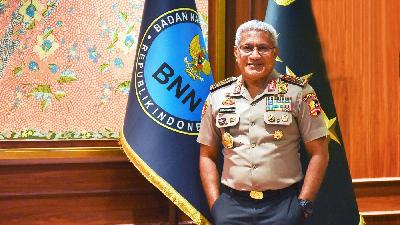
The BNN indicates Indonesia is a potential market for international drug networks. An interview with the Chief of the National Narcotics Agency (BNN), Comr. Gen. Marthinus Hukom.
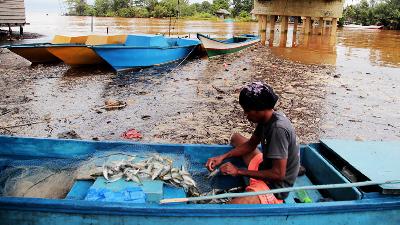
Indigenous people and villagers in Central Halmahera are facing clean water crisis. Community wells and river water are contaminated by nickel mining.
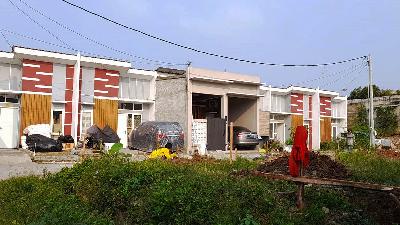
Workers and entrepreneurs consider that the Tapera policy overlaps with the MLT program. Developers continue to benefit from both programs.

One of the men who stalked the Assistant Attorney General is from the counterterrorism unit under the former Red and White Task Force. The operation is suspected to suppress the investigation of high-profile cases.

The slow issuance of import permits is causing the price of garlic to skyrocket. The government is retaining the RIPH requirements for garlic imports.

Tourism and Creative Economy Minister Sandiaga Salahuddin Uno assures that the tourism fee will not be imposed on plane tickets.

The four big banks that dominate the Indonesian banking market are backed by strong capital and major innovations. Small banks will have an even smaller piece of the pie.

BI Rate hike fails to boost the rupiah. The markets await certainty on the new government’s fiscal policy direction.

Over the last three years, the police arrested producers of videos depicting the torture of baby monkeys. Their networks spread as far as the United States.

Global market turmoil continues to shake currencies worldwide. No one knows how long the rupiah can hold on.

The extra-long lame-duck period creates many conflicting policies when the global market is in turmoil. The rupiah is under pressure.
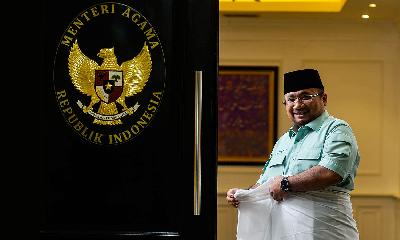
Religious Affairs Minister Yaqut Cholil Qoumas explains the regulation regarding the use of loudspeakers in mosques and outlines plans to ensure that religious affairs offices provide services for all faiths.

The market is indeed the drama of our time. Even power and control can be offered and bargained for or made dull.

The Attorney General's Office is investigating alleged corruption over tin mining permits in Bangka Belitung. The investigation must also reveal the backers.

Prabowo shows some changes in his economic approach. The market is unconvinced yet.
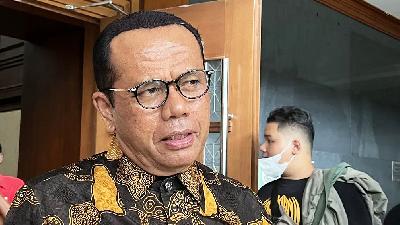
An interview with Juniver Girsang, the lawyer of Fajar Bhakti Lintas Nusantara directors, on the role of the Coordinating Minister for Maritime Affairs and Investment Luhut Pandjaitan in the internal dispute of a nickel company.

An interview with Coordinating Minister for Maritime and Investment Affairs Luhut Binsar Pandjaitan, who has a role in a dispute at a nickel corporation.

Minister Luhut Pandjaitan is personally mediating a conflict involving a Chinese nickel company. The strife involves reports to the National Police.

Indonesia’s financial market sentiment will be rocked by DPR’s initiative to execute its right of inquiry. Rice inflation is another serious threat.

The heat of political tensions and China's economic weakness is dampening financial market sentiment in Indonesia. This could persist for a while.

Staying sane in sickening times, when people everywhere are fed up with the rise of political populism.

Is the fire at Tsingshan Indonesia nickel smelter really going to be blamed on workers?

The government makes things easier for the smelter industry by eliminating many regulations that are not investment-friendly.

The case of a fire breaking out at an ITSS nickel smelter is pointing towards procedural violations. The Coordinating Ministry for Maritime Affairs is using a criminal approach that targets workers, while the Ministry of Manpower is targeting corporate suspects.

Interest rate direction will be the dominant driving force in the market throughout this year. Market correction is imminent.

Stock market enjoyed a bull run in 2023. Investors bet on a frayed assumption: six times rates cut in 2024.

Supervision of workers’ health and safety in smelters is considered inadequate. There has been a lack of specialized inspectors following the transfer of supervision authority.

The Tsingshan nickel smelter fire in Morowali is suspected to be caused by procedural errors. Initial findings in the investigation point to misconduct.
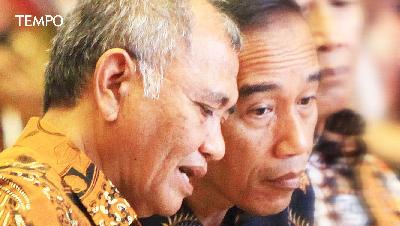
President Jokowi and former KPK Chief Agus Rahardjo are trading denials relating to the handling of the electronic ID card corruption case. This is proof of the weakening of the KPK.

TikTok Shop’s market soars in a very short time. Their strategy will be imitated by other social media.
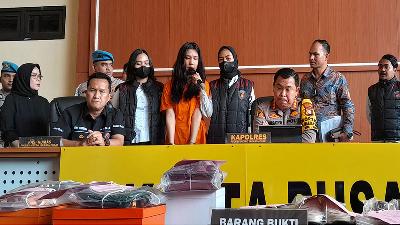
Coldplay concert ticket swindlers allegedly used compliment tickets for sale to spectators. It is the common mode of ticket scalpers’ business operation.

The financial market believes the Federal Reserve will cut its rate as soon as next May. But, the risks are still there.

There are increasing anti-LGBT opinions voiced in a number of regions. This is a wicked tactic from politicians blindly seeking popularity.

The Federal Reserve's interest rates hike will still threaten the Indonesian economy. There are also political risks from the 2024 elections.

The water of the Sagea River in North Maluku is polluted by nickel mining. The environmental danger is becoming more real as the price of nickel on world markets plummets.

Sagea River is polluted as a result of deforestation by a number of nickel mining companies. Its water is no longer safe for drinking.

Bank Indonesia’s rate hike fails to stop the rupiah from stumbling. Political intervention in judiciary system makes it even worse.

Prabowo Subianto will almost certainly choose Gibran Rakabuming Raka as his vice-presidential running mate. Jokowi supports a Prabowo-Gibran ticket.

The fate of rupiah is solely dependent on the market’s mercy, not Bank Indonesia’s nor the government’s policies.
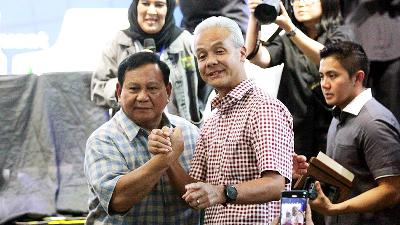
The idea for a Prabowo Subianto-Ganjar Pranowo presidential ticket resurfaces. Both camps are resolved to field their nominees as presidential candidates.
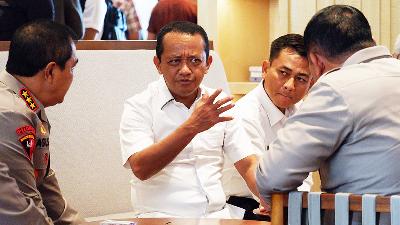
Residents of Rempang Island still refuse to relocate. The Investment Minister makes a relocation agreement with the community leader.

Commotion ensues as PGN makes plans to raise the price of gas for industries. Entrepreneurs are lobbying officials, from ministers to the president.
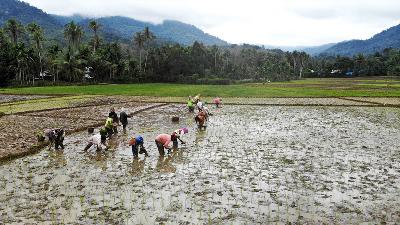
Individuals and companies are already implementing carbon trading in the voluntary market. But no price standard has been set.

Law enforcement against illegal nickel mining must be accompanied by improvements to the management of the extractive industry.
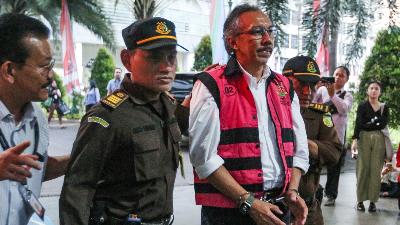
Former Director-General of Mineral and Coal, Ridwan Djamaluddin, is named as suspect in the Mandiodo Block nickel corruption case.

The carbon market is to open in September. The regulations and infrastructure are not yet in place.

Russia’s invasion of Ukraine ignites a black market fever for cheap crude oil. Pertamina refuses it, Bakamla captures a tanker transporting the oil.

As a stainless steel raw material, nickel will keep bringing fortune to Indonesia. However, if the demand for nickel for the electric vehicle industry continues to fall, we cannot hope that the price will keep rising in the coming years.
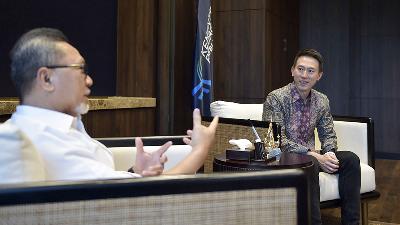
TikTok Shop is expanding more intensively in Indonesia. Funds worth hundreds of trillions of rupiah are disbursed to control the e-commerce market.

Indonesia's economy is still fine. However, unstable global economic conditions can pose a great risk, so Bank Indonesia must take a position of more neutral monetary policy.

Sea sand miners stand to make huge profits since the government allows its export. It has the potential to being in the equivalent of hundreds of trillions of rupiah in foreign exchange.
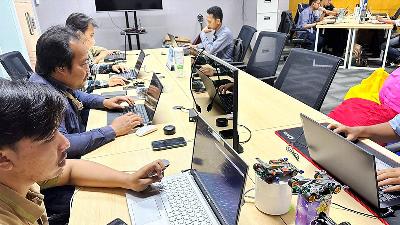
The services of ethical hackers are becoming a necessity in face of the rash of ransomware. Penetration testing skills are now a requirement for obtaining certification.

Illegal nickel mines surround Vale Indonesia’s concession area, causing environmental problems.

Foreign investors are flocking to enter the nickel processing industry. Beware of the dangers of the new electric vehicle battery technology.

Vale Indonesia records an increase in production. Indonesia’s nickel supply triggers a surplus, affecting prices.

Companies from China, Europe, and the United States dive into nickel smelter projects. They are vying for positions in the electric vehicle ecosystem.

Police seized a Lamborghini Aventador with a fake license plate from a Russian tourist. The car disappeared twice.
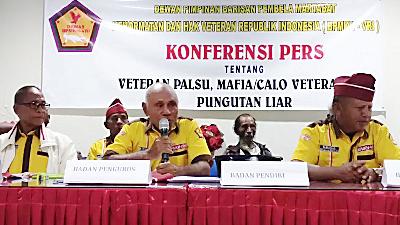
The LVRI reports thousands of fake veterans of Operation Seroja in East Timor to various government agencies. Brokers were involved in the deceit.

The nickel boom may still continue for several years. However, if no anticipatory moves are made, various challenges can end the glory days of nickel sooner than expected.

Reader’s letters on Constitutional Judge Guntur Hamzah’s integrity and the Domestic Workers Protection Bill.

The dispute surrounding nickel mine of Citra Lampia Mandiri involves Haji Isam and a police general. Eddy Hiariej is mediating.

Jokowi is preparing a Ganjar-Prabowo ticket to face Anies Baswedan. Extending the presidential term remains an option.
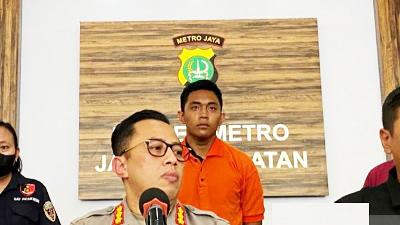
Neighbors say that Mario Dandy Satriyo often speeds on his motorbike and have noisy gatherings till late at nights. He gets into fights at school.

Domestic workers in Indonesia are extremely vulnerable. The law on the protection of domestic workers would protect them.
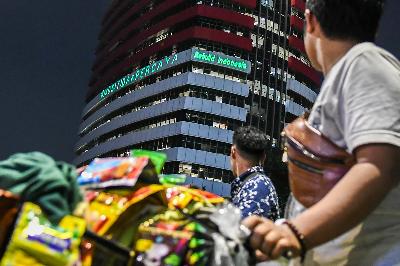
News summary on the weakening corruption eradication, reopening of the Indosurya case, and the Constitutional Court ruling on interfaith marriage.
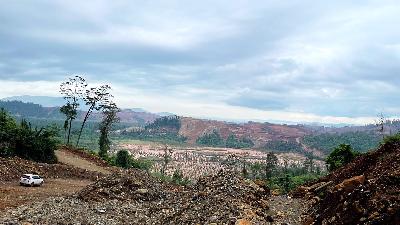
Illegal nickel mining runs rampant in Sulawesi. It is the result of bad governance.
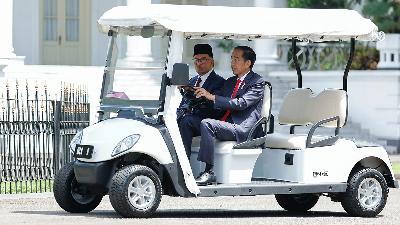
Malaysia Prime Minister Anwar Ibrahim promises to protect Indonesian migrant workers.

Mining companies launder illegal nickel all the way to smelting companies. They pay coordination fees to law enforcement officers.

Employees at the nickel ore smelter Gunsbuster Nickel Industry in Morowali are killed during a riot. Workers demand certain rights.

The mining and processing of nickel is powering the local economy. It alters traditions and changes the environment.
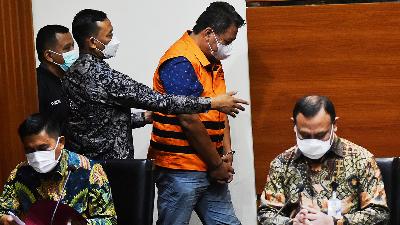
As a case broker, Bambang Kayun, allegedly conspired with investigators from the National Police Criminal Investigation Department. He has long been suspected.
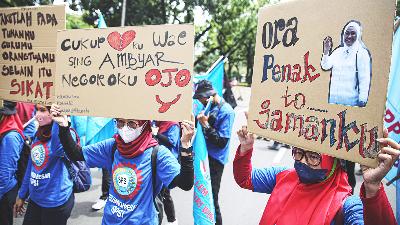
Rejecting the Perpu on Job Creation, groups of workers and civil societies plan to launch their actions. They are preparing their narrations and hashtags.

The environmental impact of Indonesia’s nickel mining.

The Chinese government sent signals it will relax its pandemic management policies. Financial markets around the world breathed a sigh of relief at the signal.

Green financing for both industries and electric vehicle credits remains low. Capital owners are waiting for the electric car and motorcycle markets to grow.

This award becomes a new standard for PNM to develop and keep growing. #Infotempo

PLN transforms itself into a holding entity with four subholding companies. The restructuring of PLN’s assets will continue until the end of this year. Workers suspect covert privatization.
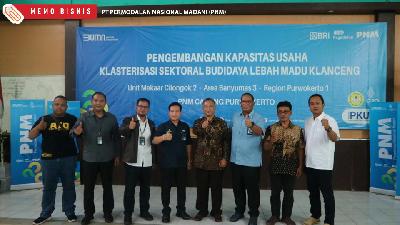
The training was given to PNM Mekaar customers in the Purwokerto area with a total of 50 participants. #Infotempo

Why is the fuel price hike controversial?

Monkeypox spreads quickly. The government is urged to move quickly to tighten and keep an eye on travel and animal trade.
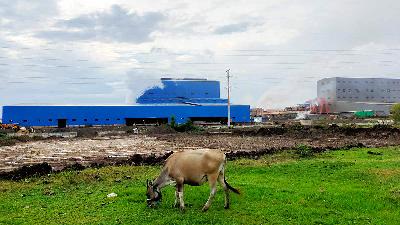
Residents around the Bantaeng Industrial Park are complaining about pollution from Huadi Nickel-Alloy Indonesia’s smelter. Nickel and iron contents in the wastewater exceeded the quality standard.

The government’s tardiness in anticipating the spread of foot-and-mouth disease in livestock has led to problems. Some people are seeking to make profits from the import of beef and vaccines.

What is happening in the commodity market should be ringing alarm bells for investors, and especially for the economic authorities in Indonesia.
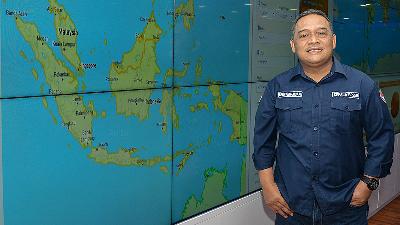
Coalition of Sovereign Migrant Workers has the data of 149 Indonesian workers suspected to have died from inhumane treatment they received at a Sabah immigration detention center in Malaysia. How is BP2MI Chief Benny Rhamdani handling this case? Did this tragedy really happen? Benny also talks about his efforts to combat illegal migrant worker placement syndicates and loan sharks.

President Jokowi is encouraging several candidates to partake in the 2024 presidential election. These political acrobatics are potentially damaging to democracy.
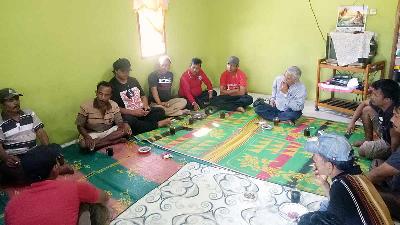
Indigenous people in North Sumatra are protesting the taking of their customary land for the state forest. There is no transparency about the installment of the boundary markers.

The Mandiodo Block in North Konawe belonging to a state-owned enterprise is being fought over by a dozen nickel mining companies. This ignores a Supreme Court ruling.

The increasing global oil prices add pressure to Pertamina’s finances. The state budget is allocated to curb the fuel price hike.

The Russia-Ukraine war raises the prices of Indonesia’s export commodities. Financial markets are still under threat.

The Saudi Arabian government and several Islamic countries also regulate the use of mosque loudspeakers to avoid disturbance. Why should we fuss about it?
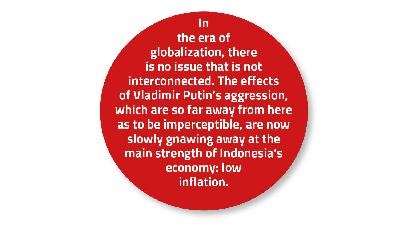
The consequences of the Russia-Ukraine conflict are dire, not just for the financial market but also for the global economy which is still in tatters and recovering.

The change in the rules regarding old-age benefits (JHT) payouts is a threat to workers who lose their jobs. The accountability of the workers’ funds management has been called into question.
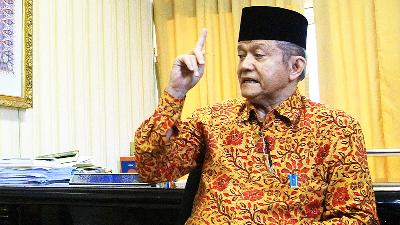
The Indonesian Ulema Council’s (MUI) Deputy Chair Anwar Abbas explains steps his organization has taken after its board members were arrested on terrorism charges. He also criticizes rising economic and landownership disparities under the Jokowi administration.
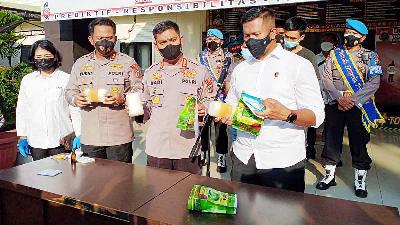
Fake drug dealers are arrested and illegal investment platforms are being blocked.

I am assisting my family in Bukittinggi, whose access to their house is blocked by a two-storey building directly in front of the fence.
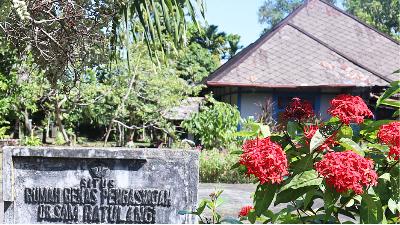
Silas Papare and some residents in Serui founded the Irian Indonesian Independence Party. They were assisted by Sam Ratulangi.
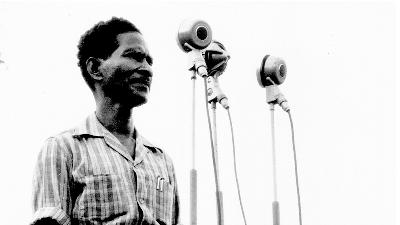
Silas Papare helped the Allies fight against the Japanese in West Irian. He supported Indonesian independence because of conflict with the Netherlands.
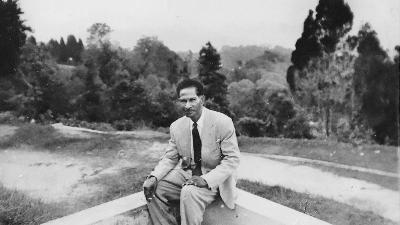
Silas Papare was close to Sukarno. He refused to participate in the 1969 referendum because he was once arrested by the military.

Top management of Bank Mayapada allegedly obtained kickbacks from customer credit disbursements. The OJK was lax in their oversight of this bank owned by a member of the Presidential Advisory Council.

Learning from Japan. When development is planned, the government discusses it with the public until an agreement is achieved.

On moral lessons from Japan and the USA, and how the BPK should prevent state budget corruption.

The Bukalapak initial public offering (IPO) is the beginning of a list of digital unicorns entering Indonesian Stock Exchange. Retail investors and public fund managers need to be cautious.

Bukalapak is breaking new record at the Indonesian Stock Exchange. Speculations on the potential big investors remain.

Delving further into the literary works of Nobel laureates from Japan like Kawabata and Yukio Mishima, we can notice the very paternalistic puritan morals of Asian nations.

I WAS a participant with the highest rating in the #maudigaransimurah program of Bukalapak carried out on October 7-December 31, 2019.
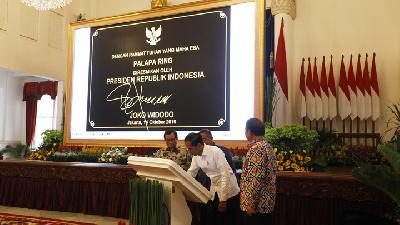
The promise of fast and cheap Internet access in outer regions through the Palapa Ring has yet to materialize. The stumbling block is connecting the Internet to the optic fibre cable network.

Malaysia's political crisis began when Mohamed Azmin Ali and a number of parliament members from Pakatan Harapan (The Alliance of Hope) met with opposition parties.

With 'stone' as the common thread, Babad Batu is a cerebral journey on a road with many side roads. Sapardis latest collection is encyclopedic, primordial and political.

To some conservative Japanese reactionaries, writer Aiko Kurasawa is unpatriotic because she wrote a book on the cruelty of the Japanese military in Javanese villages. She has been branded by some as a communist. Kurasawa's interest in Indonesia began a long time ago, when she first read about Sukarno, whom she regards as a hero of the Asia-African movement. Not surprisingly, when the 1965 events exploded, she was devastated upon reading about the resulting fall of Sukarno. "I was shocked," said Kurasawa, who was recently interviewed at her home in south Jakarta.

Regarded as the Golden Age of Indonesian history, the vast maritime empire of Majapahit reached its apogee in the 14th century. Though it thrived for only 300 years (late 13th century to early 16th century), Majapahit was Indonesia's greatest state, the last in a long line of Buddhist and Hindu Javanese kingdoms. Islam had ostensibly erased Indian cultural traditions by the 16th century, yet Buddhist-Hindu traces can still be seen in the rituals and architecture of the kraton courts of Bali and central Java, and innumerable motifs and styles of the earlier cultures are found everywhere in Indonesian art.

For the second time this year, and against his doctor's advice, senior economist Gustav F. Papanek from Boston University returned to Indonesia. With a new government in place, this 87-year-old former advisor to the 'Berkeley Mafia'influential economists of the New Order erafelt the need to address a very urgent problem: The declining income of the poor, which as he noted "is immoral and also politically undesirable; therefore, it is important to take substantial steps to increase their income. The only way you can do that is by providing industrial jobs."
Although he was unable to meet President Joko Widodo, he managed to meet Sofyan Djalil, Economic Coordinating Minister; General Moeldoko, Armed Forces Chief; and ChatibBasri, former Finance Minister, and gave talks in three universities and Bank Mandiri as well as numerous interviews with the media. In a packed schedule, averaging two presentations a day, he found ways to push his ideas.

The banking business is in a flux as a result of the war of interest rates among banks. But the owner of the Mayapada Group, Dato Sri Tahir, is optimistic that the banking sector in Indonesia will continue to grow. "Growth depends on situations and conditions," Tahir told Tempo, two weeks ago. Having travelled all over the world, Tahir concluded that the best investment opportunities are still found in Indonesia.
He believes that investment opportunities in Indonesia are still better and that includes the business prospects of his Mayapada Group. He told Tempo reporter Christine Munthe in an interview that he would never sell Mayapada for whatever price. Excerpts:

Slum dwellings can be found throughout the Sunda Kelapa zone. Developing the area will require a major clean up.

Early in March, Agus Aris Munandar, an archeology professor at the University of Indonesia, presented a controversial lecture: there were no canals in Majapahit. He refuted all theories that Majapahit was a canal city, including the intensive research by senior archeologist Mundardjito. How did Mundardjito react?

Lured by bombastic ads on local and national television, thousands of cancer patients have become victims of the Harapan Baru traditional Chinese clinics, particularly its branch in Medan, North Sumatra. Harapan Baru guarantees cures with its herbal treatment while infusing patients intravenously with chemotherapy, an illegal procedure given that the traditional healers are not licensed to practice modern medicine. Steroids about 200 times the strength of morphine are another 'magical' cure. This medical and ethical violation has been going on for years, yet the regulatory seem to turn a blind eye.

A number of researchers have been to Holland in search of traces of the Sundanese dangding poetry of Hasan Mustapa, trying to find original manuscripts of this little known literary figure.

The burial ritual for Granny Kapa involved 400 residents, a month’s preparation, and costs around Rp1 billion.

He was known to be close to Japan but he was smart enough to lessen their pressure and to usher in the proclamation of Indonesia’s independence.

Japan’s Democratic Party won a landslide victory in the recent general election. But the public still doubts Yukio Hatoyama’s capability as the new Prime Minister.

This travel account penned by 21 Indonesian architects in Japan is not merely concerned with buildings.

There have been increasing demands to implement one of the key elements of the 1998 Reforms. Indeed, a number of things have been achieved, like cutting down the military’s political rights in parliament during the 2004 General Elections. Law No. 34/2004 on the TNI says the TNI businesses must be cleaned up. After the data collection team—implemented by Secretary of State-Owned Enterprises, Said Didu—verification will be carried out by the National Team on TNI Assets Takeover, led by Erry Riyana Harjapamekas.

For years, a timber mafia worked in unison to plunder the forests of Ketapang, West Kalimantan. They consist of dealers, loggers, members of the Forestry Office, police officers, officials of the Forestry Department and authorities from the local regency government. The Joint Team of National Police Headquarters and the Forestry Department estimates that state losses amount to Rp32.4 trillion annually. This is equivalent to 26 times the 2008 regional budget for West Kalimantan province.
Three weeks ago, the Joint Team was able to dismantle the mafia’s timber network in Ketapang. Among those arrested were the head of the Ketapang Office of Forestry, the Chief of the Ketapang District Police, and a candidate for the office of regent. Tempo reports from Ketapang.

The crewmen of a Japanese ship abducted in the Malacca Strait were released. Tokyo has urged that security in the area be increased.

One Japanese cosmetic company holds 24 patents over Indonesian indigenous plants. Must we now pay taxes on the spices in our own backyards?
Independent journalism needs public support. By subscribing to Tempo, you will contribute to our ongoing efforts to produce accurate, in-depth and reliable information. We believe that you and everyone else can make all the right decisions if you receive correct and complete information. For this reason, since its establishment on March 6, 1971, Tempo has been and will always be committed to hard-hitting investigative journalism. For the public and the Republic.